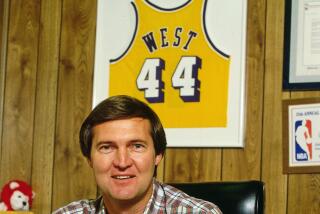‘Dream Team’ Betrays Basketball’s Beauty
I am one of those stupid white men Michael Moore rails against. I like Dubya. I’m pro-life. I love ‘50s rock ‘n’ roll. I abhor rap music. And I no longer watch NBA basketball.
I don’t like the game or, at least, I don’t like the way the NBA is playing it. It’s too much about unthinking athleticism where “in your face” is more important than scoring points and winning the game. If you don’t believe me, just watch our all-NBA “Dream Team” in the Olympics. As I write this, it’s still in the running, and it may get better, but so far it hasn’t been pretty.
I loved the basketball of the NBA’s golden years, in the ‘50s, ‘60s and ‘70s, as played by the likes of Oscar Robertson, Walt “Clyde” Frazier and Bill Russell. They played an aesthetically beautiful, smart game that had resonance for my life. That’s why we turn to sports, or music, or books or films. We expect them to speak to us.
The basketball of Robertson, Frazier and Russell spoke to me of hard work, discipline, teamwork and, most of all, intelligence. They showed me lessons I could incorporate into my mundane existence. NBA/USA basketball today says nothing to me other than that some people are blessed with physical attributes and the rest of us aren’t.
Did you watch when Puerto Rico beat the Dream Team? It was a nightmare. The Americans lost that one, and they barely beat a leaden-footed but deadly shooting Greek team that got into the Olympics only because Greece is the host country. In that game, our players couldn’t shoot a decent jump shot, set a strong pick, execute a crisp pass, play defense (blocking shots is not the same as preventing them). But, oh, how they could run and jump and perform backward, behind-the-head dunks on unguarded fastbreaks -- which counted only for two points, while all those boring, classic Greek jump shots from the three-point range counted for, you guessed it, three points.
According to Allen Iverson, the most quoted member of the Dream Team, “As far as talent, we have the best talent.” He’s right. The U.S. players can run faster and leap higher than virtually any of the other players I’ve seen so far in Athens.
And that’s my point: The U.S. players see the game as an expression of pure self, pure talent. Learned talent, team talent, practiced talent are as boring to acquire as they are to exhibit. A really good jump shot looks like every other good jump shot. It’s not going to make the highlight reel. It’s just going to help the team win.
When Bill Russell snared a defensive rebound for the Boston Celtics in the golden years, he pitched it out to his point guard, K.C. Jones. K.C. lead a fastbreak, passing left and right until heads were spinning and Sam Jones or John Havlicek or K.C. himself was free for an easy layup. If they missed, Russell would be there to rebound and slam it home.
Not much in sport has ever been as pleasing as a Boston Celtic fastbreak. It wasn’t flashy so much as methodical. It relied on precision acquired through practice and thought, so that hard work looked like instinct.
I once saw Oscar Robertson score 53 points in Madison Square Garden, inconspicuously. He wasn’t very fast, but he was quick. He couldn’t jump very high, no dunks. He was just an exacting, thoughtful player. He had an almost unstoppable jump shot that was pure elegance. Oscar would head-fake his opponent, who would leave his feet. As the defender went by on the way down, Oscar was up, lofting a sweet, soft shot that seldom missed.
That jump shot wasn’t a natural move; Oscar didn’t rely on his leaping ability to out-jump his opponent. He barely left his feet. He relied on timing that he’d practiced for so many years in a gym.
Which brings me back to the Olympics. The U.S. basketball team looks as if, collectively, it hasn’t practiced a single aspect of the game that isn’t related to each player’s superior physical talent. And oh how talented the members are. They can really do that thing they do.
Too bad it isn’t beautiful basketball. Too bad it can’t speak in a language worth listening to.
Pat Jordan, a pitcher in the minor leagues in the early 1960s, is the author of “A Nice Tuesday” (St. Martin’s Press, 1999).
More to Read
Go beyond the scoreboard
Get the latest on L.A.'s teams in the daily Sports Report newsletter.
You may occasionally receive promotional content from the Los Angeles Times.






